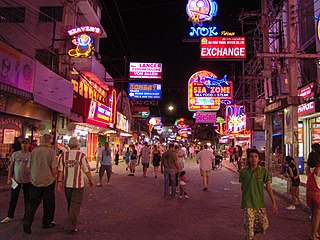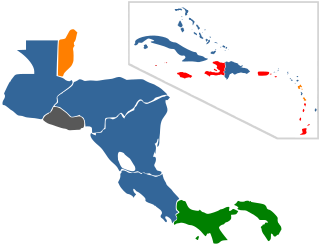Related Research Articles

Prostitution in Thailand is officially illegal However, due to police corruption and an economic reliance on prostitution dating back to the Vietnam War, it remains a significant presence in the country. It results from poverty, low levels of education and a lack of employment in rural areas. Prostitutes mostly come from the northeastern (Isan) region of Thailand, from ethnic minorities or from neighbouring countries, especially Cambodia, Myanmar, and Laos. UNAIDS in 2019 estimated the total population of sex workers in Thailand to be 43,000.
Prostitution in Myanmar is illegal, but widespread. Prostitution is a major social issue that particularly affects women and children. UNAIDS estimate there to be 66,000 prostitutes in the country.
Prostitution in Greece is legal at the age of 18, and regulated. It is estimated that fewer than 1,000 women are legally employed as prostitutes and approximately 20,000 women, half of whom are of foreign origin and the other half are Greek, are engaged in illegal prostitution. Many women affected by the economic crisis have turned to prostitution through poverty.

Prostitution in Spain is not addressed by any specific law, but a number of activities related to it, such as pimping, are illegal. In 2016, UNAIDS estimated there to be 70,268 prostitutes in the country, although other estimates put the number higher. Most prostitutes in the country are immigrants. The sex industry in Spain is estimated to be worth €3.7 billion.
Prostitution in Guatemala is legal but procuring is prohibited. There is an offence of “aggravated procuring” where a minor is involved. Keeping a brothel is not prohibited.
Prostitution in Senegal is legal and regulated. Senegal has the distinction of being one of the few countries in Africa to legalize prostitution, and the only one to legally regulate it. The only condition that it is done discreetly. Prostitution was first legalised in 1966. UNAIDS estimate that there are over 20,000 prostitutes in the country. The average age for a sex worker in Senegal is 28 years old and female.
Prostitution in Ecuador is legal and regulated, as long as the prostitute is over the age of 18, registered, and works from a licensed brothel. Prostitution is widespread throughout the country. Many brothels and prostitutes operate outside the regulatory system and the regulations have been less strictly enforced in recent years. 25,000 prostitutes were registered in the year 2000. In 2007 it was estimated that 70% of the prostitutes in the country were from Colombia. The country attracts Colombian prostitutes as the currency is the US$ rather than the unstable Colombian peso. UNAIDS estimate there to be 35,000 prostitutes in the country.
Prostitution in Uruguay was legislated in 2002 through the sex work law (17.515). Before that, prostitution was unlegislated but it was not illegal, since the constitution allows any activity that is not forbidden by law. Prostitution is currently not a subject of debate.
Prostitution in Paraguay is legal for persons over the age of 18, but related activities such as brothel keeping are prohibited. Prostitution is common in the country. Brothels are also common, even some rural villages have a small bar/brothel on the outskirts.
Prostitution in Georgia is illegal but widespread, particularly in the capital, Tbilisi. Many NGO's attribute this to the harsh economic conditions according to the US State Department. Prostitution occurs on the streets, in bars, nightclubs, hotels and brothels. UNAIDS estimate there are 6,525 prostitutes in Georgia.
Prostitution in Zambia is legal and common. Related activities such as soliciting and procuring are prohibited. UNAIDS estimate there are 9,285 prostitutes in the capital, Lusaka. Many women turn to prostitution due to poverty. Sex workers report law enforcement is corrupt, inconsistent and often abusive.
Prostitution in Guyana is illegal but widespread. Prostitution law is antiquated and dates from the colonial era. Law enforcement is inconsistent and sex workers report violence and abuse by the police. Many turn to prostitution for economic reasons and the lack of other job opportunities. Prostitution continues to receive greater public attention due to the high incidence of HIV/AIDS among prostitutes. Prostitution in the country is separated into three types: "uptown", servicing affluent clients, "downtown", servicing the working classes, and mining sites. UNAIDS estimate there to be 6,000 prostitutes in the country.
Prostitution in Namibia is legal and a highly prevalent common practice. Related activities such as solicitation, procuring and being involved in the running of a brothel are illegal. A World Bank study estimated there were about 11,000 prostitutes in Namibia.
Prostitution in Eritrea is legal and regulated. Official figures state there are around 2,000 prostitutes in the country, who are not allowed to operate near schools, hospitals, and churches. According to the 2009 Human Rights Reports, security forces occasionally follow women engaged in prostitution and arrest those who had spent the night with a foreigner. Some women enter prostitution due to poverty. Prostitutes are known locally as "shermuta" in Arabic, or "mnzerma" and "me'amn" in Tigrinya.
Prostitution in Uzbekistan is illegal, but prostitution has increased within the country since the collapse of the Soviet Union. UNAIDS estimated there to be 22,000 sex workers in the country in 2019. Many of the women have turned to prostitution in Uzbekistan because of poverty.
Prostitution in Togo is legal and commonplace. Related activities such as solicitation, living off the earnings of prostitution or procuring are prohibited. Punishment is up to 10 years imprisonment if minors or violence is involved.
Prostitution in Botswana is not illegal, but laws such as public disorder, vagrancy, loitering and state recognised religious provisions are used to prosecute prostitutes. Related activities such as soliciting and brothel keeping are illegal. Botswana has made proposals to make prostitution legal to prevent the spread of AIDS. However, there has been mass opposition to it by the Catholic Church. Prostitution is widespread and takes place on the street, bars, hotels, brothels and the cabs of long-distance trucks.
Prostitution in Angola is illegal and prevalent since the 1990s. Prostitution increased further at the end of the civil war in 2001. Prohibition is not consistently enforced. Many women engage in prostitution due to poverty. It was estimated in 2013 that there were about 33,00 sex workers in the country. Many Namibian women enter the country illegally, often via the border municipality of Curoca, and travel to towns such as Ondjiva, Lubango and Luanda to work as prostitutes.
Prostitution in South Sudan is legal but related activities such as soliciting or brothel-keeping are illegal.

Legality of prostitution in the Americas varies by country. Most countries only legalized prostitution, with the act of exchanging money for sexual services legal. The level of enforcement varies by country. One country, the United States, is unique as legality of prostitution is not the responsibility of the federal government, but rather state, territorial, and federal district's responsibility.
References
- 1 2 3 4 5 "100 Countries and Their Prostitution Policies". Procon. Retrieved 31 December 2017.
- 1 2 3 4 5 6 van Wanrooij, Dennis (2 March 2015). "OTS: Mapping Human Rights Violations Against Sex Workers in El Salvador - Red Umbrella Fund". Red Umbrella Fund. Retrieved 31 December 2017.
- 1 2 3 4 5 "Prostitution in El Salvador, San Salvador". Dismal World. 25 January 2008. Retrieved 1 January 2018.
- ↑ "EL SALVADOR: AUTHORITIES ORDER CLOSURE OF BROTHELS". AP Archive. 31 August 1998. Retrieved 31 December 2017.
- ↑ Flores, Jesus (9 September 2008). "Death and Prostitution at "The Child's Park"". Jesus Flores Fotos. Retrieved 1 January 2018.
- ↑ "Country Reports on Human Rights Practices; El Salvador". U.S. Department of State. Retrieved 13 February 2008.
- ↑ Barry, Kathleen (1995). The prostitution of sexuality . New York: New York University Press. ISBN 978-0814712177.
- ↑ "Sex workers: Population size estimate - Number, 2016". www.aidsinfoonline.org. UNAIDS. Archived from the original on 4 June 2019. Retrieved 21 July 2018.
- ↑ "Asociación Mujeres Flor de Piedra". Yellow Page (in Spanish). Retrieved 1 January 2018.
- 1 2 3 4 5 6 "Health Profile: El Salvador" Archived 13 September 2008 at the Wayback Machine . United States Agency for International Development (June 2008). Accessed 7 September 2008.
 This article incorporates text from this source, which is in the public domain .
This article incorporates text from this source, which is in the public domain . - ↑ Worst Forms of Child Labour - El Salvador: Global March Against Child Labour Archived 11 October 2009 at the Wayback Machine . Globalmarch.org. Retrieved on 30 March 2011.
- ↑ Comparative Criminology | North America - El Salvador. Rohan.sdsu.edu. Retrieved on 30 March 2011.
- 1 2 "El Salvador 2017 Trafficking in Persons Report". U.S. Department of State. Archived from the original on 3 July 2017. Retrieved 31 December 2017.
 This article incorporates text from this source, which is in the public domain .
This article incorporates text from this source, which is in the public domain .